
Turkish Journal of Geriatrics-Turk Geriatri Dergisi
Scope & Guideline
Exploring the frontiers of gerontology.
Introduction
Aims and Scopes
- Geriatric Medicine and Clinical Practice:
The journal focuses on research that explores clinical practices in geriatrics, including diagnosis, treatment, and management of diseases prevalent among older adults. - Public Health and Epidemiology:
It emphasizes studies on public health issues, health services research, and epidemiological studies that affect the elderly population, particularly in the context of Turkey. - Psychosocial Aspects of Aging:
Research addressing the psychological, social, and emotional components of aging is a significant focus, including studies on mental health, loneliness, and quality of life in older adults. - Innovations in Geriatric Care:
The journal encourages submissions on innovative practices, technologies, and methodologies aimed at improving the care and quality of life of elderly patients. - Nutritional and Physiological Studies:
Research on nutrition, metabolism, and physiological changes in the aging population is frequently published, highlighting the importance of these factors in the overall health of older adults. - Multidisciplinary Approaches:
The journal values interdisciplinary research that integrates different fields such as psychiatry, pharmacology, nutrition, and rehabilitation in addressing geriatric health issues.
Trending and Emerging
- Impact of COVID-19 on Elderly Care:
Research focusing on the effects of the COVID-19 pandemic on elderly populations, including mental health, healthcare access, and frailty, has surged, highlighting the urgent need to address pandemic-related challenges. - Frailty and Sarcopenia Research:
There is an increasing emphasis on studies exploring frailty and sarcopenia, reflecting a growing recognition of their significance in predicting adverse outcomes in older adults. - Telehealth and Remote Monitoring:
The rise of telehealth and remote patient monitoring technologies in geriatric care has become a prominent theme, driven by the necessity for innovative care solutions during the pandemic. - Multimorbidity and Comprehensive Care Models:
Recent publications explore the complexities of managing multimorbidity in older adults, advocating for comprehensive care models that address multiple health conditions simultaneously. - Mental Health and Cognitive Function:
There is a growing body of research dedicated to understanding the mental health challenges faced by older adults, particularly in relation to cognitive decline and dementia.
Declining or Waning
- Traditional Pharmacological Studies:
There has been a noticeable decrease in studies focusing solely on traditional pharmacological interventions for geriatric patients, suggesting a shift towards exploring more holistic and multidisciplinary approaches to treatment. - Longitudinal Studies:
The frequency of longitudinal studies examining the long-term outcomes and trajectories of aging-related health conditions has diminished, which may reflect a broader trend towards cross-sectional studies. - Basic Science Research:
Research that delves deeply into basic science aspects of aging, such as cellular and molecular mechanisms, appears to be less represented in recent publications, indicating a possible shift towards clinical and applied research. - Aging and Technology Studies:
Although technology in geriatric care remains relevant, the specific focus on aging-related technology studies, such as telemedicine efficacy, has not been as prominent in recent issues. - Cultural and Societal Perspectives on Aging:
There seems to be a decline in studies that explore cultural attitudes and societal perspectives on aging, which may indicate a need for more research in this area to understand diverse aging experiences.
Similar Journals
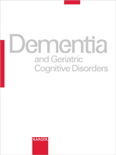
DEMENTIA AND GERIATRIC COGNITIVE DISORDERS
Empowering healthcare through accessible dementia research.DEMENTIA AND GERIATRIC COGNITIVE DISORDERS is a distinguished peer-reviewed journal published by KARGER, based in Switzerland. With a focus on the critical fields of cognitive neuroscience, geriatrics, and psychiatry, this journal is integral to advancing our understanding of cognitive decline and geriatric health. Despite being established from 1990 through 1992 and relaunching its scope in 1994, it has consistently provided a platform for innovative research, as reflected in its strong impact factor and notable Scopus rankings, placing it in the Q2 quartile for disciplines including cognitive neuroscience and geriatric medicine. The journal aims to foster interdisciplinary dialogue and collaboration among researchers, healthcare professionals, and educators, contributing to the growing field of dementia research and elderly care. Open access options further ensure that this vital knowledge is widely accessible, making a significant impact in both academic and clinical settings. With a commitment to quality and relevance, DEMENTIA AND GERIATRIC COGNITIVE DISORDERS remains a key resource for those dedicated to understanding and addressing the challenges posed by cognitive disorders in aging populations.
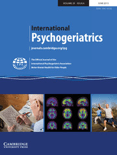
INTERNATIONAL PSYCHOGERIATRICS
Advancing the Dialogue on Aging and Mental HealthINTERNATIONAL PSYCHOGERIATRICS, published by Cambridge University Press, stands as a premier journal in the realm of Psychology, Geriatrics, and Gerontology. Established in 1989 and continuing through 2024, this journal holds a distinguished position, evidenced by its 2023 quartile rankings of Q1 in Clinical Psychology, Geriatrics, and Gerontology, and Q2 in Psychiatry and Mental Health. With an impressive Scopus ranking—19th in Clinical Psychology and 3rd in Gerontology—the journal is dedicated to advancing the understanding of mental health in older adults, making it a crucial resource for researchers, healthcare professionals, and students alike. Although it does not offer open access, the journal ensures a broad dissemination of knowledge through subscriptions while maintaining high academic standards and rigor. With a focus on critical research articles, reviews, and clinical studies, INTERNATIONAL PSYCHOGERIATRICS continues to shape the dialogue around the complex interplay of aging and mental health.

Gerontology and Geriatric Medicine
Connecting global scholars to the future of elderly care.Gerontology and Geriatric Medicine is a distinguished journal published by SAGE Publications Inc, focusing on the vital field of gerontology and geriatrics. With an impressive Q2 ranking in Geriatrics and Gerontology as of 2023, this journal serves as a crucial platform for disseminating high-quality research and innovation related to aging and elderly care. Since embracing an Open Access model in 2015, it has broadened its reach, enabling scholars, researchers, and practitioners worldwide to access valuable insights without barriers. The journal’s scope encompasses a variety of interdisciplinary studies that address the multifaceted aspects of geriatric medicine, making it an essential resource for anyone dedicated to advancing knowledge and practices in this critical domain. With its commitment to enhancing the understanding of aging populations, Gerontology and Geriatric Medicine is poised to contribute significantly to the ongoing discourse and research developments in the care for older adults.
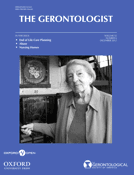
GERONTOLOGIST
Connecting Scholars to Enhance Aging ResearchThe GERONTOLOGIST, published by Oxford University Press Inc, is a premier journal in the field of geriatrics and gerontology, with a distinguished history since its inception in 1961. This esteemed journal stands out with its impressive Q1 rankings in prominent categories, including Geriatrics and Gerontology, reflecting its vital role in disseminating innovative research and advancing knowledge within these critical disciplines. With an impact factor that ranks it among the top journals in both Nursing Gerontology and Medicine, the GERONTOLOGIST serves as a key resource for researchers, professionals, and students dedicated to enhancing the health and well-being of older adults. Although it operates under a traditional access model, the journal remains committed to publishing cutting-edge studies that address the complexities of aging and inform evidence-based practices. By fostering a rich dialogue among scholars and practitioners, the GERONTOLOGIST is instrumental in shaping the future of gerontological research and policy.
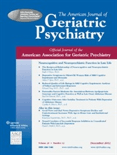
AMERICAN JOURNAL OF GERIATRIC PSYCHIATRY
Exploring the Depths of Aging Minds: Your Gateway to Geriatric PsychiatryAmerican Journal of Geriatric Psychiatry, published by Elsevier Science Inc, stands as a leading journal in the fields of geriatrics and gerontology, as well as psychiatry and mental health, recognized with a Q1 ranking in both categories for 2023. With a robust ISSN of 1064-7481 and E-ISSN 1545-7214, this journal has been a vital resource since its inception in 1993, contributing to the academic discourse surrounding the mental health of older adults. The journal focuses on publishing high-quality research and reviews that address the complexities of psychiatric disorders in geriatric populations, making it essential reading for researchers, professionals, and students dedicated to enhancing the mental well-being of elderly individuals. Notably, it achieves impressive Scopus rankings, sitting at the 5th percentile in Geriatrics and Gerontology and 24th percentile in Psychiatry and Mental Health, underscoring its impact and relevance in the academic community. While it does not offer open access, the journal's comprehensive content is vital for those looking to stay informed on the latest advancements in geriatric psychiatry. For more information, readers can access it via Elsevier's educational platforms.
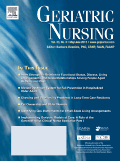
Geriatric Nursing
Fostering knowledge and innovation in geriatric nursing.Geriatric Nursing is a premier peer-reviewed journal dedicated to advancing the field of gerontology and nursing care for older adults. Published by MOSBY-ELSEVIER, this esteemed journal holds a significant place in the academic community with its Q2 ranking in both Gerontology and Medicine (miscellaneous) as of 2023, reflecting its importance and influence in the study and practice of healthcare for the elderly. With a comprehensive coverage extending from 1980 to 2024, Geriatric Nursing addresses the latest research, clinical practices, and policies impacting geriatric care, making it an essential resource for researchers, practitioners, and students alike. Although it does not provide open access options, its rigorous content garners attention with a Scopus Rank of #14 out of 39 in Nursing and Gerontology, placing it in the 65th percentile for its field. For those dedicated to improving the health and wellbeing of older populations, Geriatric Nursing remains a critical platform for innovation and knowledge dissemination.

Geriatrie et Psychologie Neuropsychiatrie du Vieillissement
Advancing the Understanding of Aging and Mental HealthGeriatrie et Psychologie Neuropsychiatrie du Vieillissement is a pivotal academic journal dedicated to the multidisciplinary study of aging, encompassing the fields of geriatrics, neuropsychiatry, and psychological health in the elderly population. Published by JOHN LIBBEY EUROTEXT LTD, this journal fosters knowledge dissemination and innovation, contributing to the understanding of the complexities faced by aging individuals. With a broad scope that includes biological psychiatry and neuropsychology, it serves as a vital resource for researchers, healthcare professionals, and students engaged in geriatric medicine and mental health. Although currently classified in the Q4 category across various relevant medical and psychological disciplines, the journal addresses critical topics that are essential for enhancing quality of care and improving patient outcomes. Additionally, the journal is accessible via open access options, promoting wide-ranging readership and collaboration within the academic community. As the field continuously evolves, Geriatrie et Psychologie Neuropsychiatrie du Vieillissement remains commited to pushing the boundaries of research and practice in gerontology and neuropsychiatry.
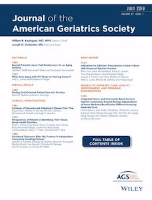
JOURNAL OF THE AMERICAN GERIATRICS SOCIETY
Transforming Knowledge into Practice for Elder CareJOURNAL OF THE AMERICAN GERIATRICS SOCIETY, published by Wiley, stands as a leading resource in the field of geriatrics and gerontology. Established in 1953 and converging into a comprehensive academic platform through 2024, this esteemed journal is recognized for its high impact, holding a Q1 ranking in its category for 2023. It serves as a vital conduit for innovative research, clinical practices, and policy discussions aimed at improving the health and well-being of older adults. With a commitment to advancing geriatric medicine, the journal contributes significantly to the ongoing dialogue among researchers, healthcare professionals, and students dedicated to this rapidly evolving field. Although currently not offering open access options, the journal remains invaluable for those seeking to access pivotal studies and reviews that shape the future of geriatrics.

Clinical Interventions in Aging
Shaping the Future of Geriatrics and GerontologyClinical Interventions in Aging is a premier Open Access journal published by DOVE MEDICAL PRESS LTD that has been at the forefront of geriatric research since its inception in 2006. With its core focus on innovative interventions and evidence-based practices to enhance the quality of life for the elderly, this journal serves as a vital resource for researchers, healthcare professionals, and students in the fields of geriatrics and gerontology. The journal boasts a commendable impact factor, achieving a Q2 ranking in Geriatrics and Gerontology and a Q1 ranking in Medicine (miscellaneous) as of 2023, highlighting its significant academic contribution. Notably, its Scopus ranking places it in the top 31% of its category, underscoring the relevance and quality of the research it publishes. With a commitment to advancing knowledge, this journal not only promotes accessibility through its Open Access model but also ensures that cutting-edge studies are readily available to those dedicated to improving geriatric care. Located in Auckland, New Zealand, the journal continues to expand its influence globally, making it an essential platform for discussions surrounding aging and health.

Aging Medicine and Healthcare
Empowering Healthcare for Aging PopulationsAging Medicine and Healthcare is a leading Open Access journal dedicated to advancing the understanding of geriatric health and the complexities of aging. Published by the Asia Pacific League Clinical Gerontology & Geriatrics, this innovative journal began its journey in 2019 and has since established itself as an important resource for healthcare professionals, researchers, and students interested in the fields of geriatrics and gerontology. With an impact factor that reflects its growing significance (ranked in the 21st percentile within its category), the journal aims to disseminate high-quality research and practical insights that can inform clinical practice and enhance patient care for aging populations. As an Open Access publication, it ensures that research findings are freely accessible, fostering collaboration and knowledge sharing among academics and practitioners globally. The journal is poised to be a vital platform for innovative studies, systematic reviews, and case reports that illuminate the challenges and opportunities in aging medicine.